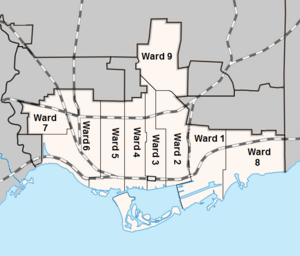
The Chairman of the Municipality of Metropolitan Toronto or Metro Chairman was the regional chair of Metropolitan Toronto, Ontario, Canada, and the most senior political figure in the municipality. The Metro Chairman was elected by the members of Metropolitan Toronto Council.

Municipal elections were held in Toronto, Ontario, Canada, on December 1, 1969. Across Metro Toronto there were few surprising results, and city of Toronto incumbent mayor William Dennison was easily re-elected. The one dramatic exception to this was on Toronto city council, where a number of long-standing members lost to young new arrivals who shared a common vision of opposition to the megaprojects that had transformed Toronto throughout the post-war period. While the reform movement candidate for mayor lost, it gained a strong presence on city council. The 1970s reform faction dominated Toronto politics for the next decade.
Municipal elections were held in Toronto, Ontario, Canada, on December 5, 1966. The elections were the first in Toronto after its merger with several smaller suburban communities on January 1, 1967. Forest Hill and Swansea were annexed by the City of Toronto, Leaside was merged with the Township of East York to become the Borough of East York. Weston was combined with the Township of York to form the Borough of York. The Village of Long Branch and the towns of Mimico and New Toronto were merged with the Township of Etobicoke to form the Borough of Etobicoke.
Municipal elections were held in Toronto, Ontario, Canada, on December 7, 1964. Incumbent mayor Philip Givens defeated former mayor Allan Lamport.
Municipal elections were held in Toronto, Ontario, Canada, on December 3, 1962. Incumbent mayor Nathan Phillips, then the longest-serving mayor in Toronto history, lost to Controller Donald Summerville by a significant margin.
The Board of Control of Toronto, Ontario, Canada, was a part of its municipal government until it was abolished in 1969. It served as the executive committee of the Toronto City Council. When it was initially created in 1896 by mandate of the provincial government, it consisted of three Controllers appointed from and by the aldermen, and presided over by the Mayor of Toronto. Beginning in 1904, the Board of Control was directly elected by the city's electorate and consisted of four Controllers, presided over by the Mayor. Each voter could vote for up to four candidates, and the four with the most votes were elected. By tradition the controller who received the most votes would get the powerful budget chief position.
Municipal elections were held in Toronto, Ontario, Canada, on December 1, 1958. Four year incumbent mayor Nathan Phillips won reelection against Controller Ford Brand, who was supported by the Co-operative Commonwealth Federation and Toronto Labour Council, and Controller Joseph Cornish.
Municipal elections were held in Toronto, Ontario, Canada, on December 3, 1956. Incumbent mayor Nathan Phillips was easily reelected. Jean Newman became the first woman elected to the Board of Control, and topped the poll to become budget chief.
Municipal elections were held in Toronto, Ontario, Canada, on December 5, 1955. Incumbent mayor Nathan Phillips, elected a year earlier, was easily reelected, defeating Controller Roy E. Belyea and Trotskyist Ross Dowson.
Municipal elections were held in Toronto, Ontario, Canada, on December 6, 1954. Incumbent mayor Leslie Saunders was defeated by Nathan Phillips in a close contest.
Municipal elections were held in Toronto, Ontario, Canada, on December 7, 1953. Incumbent mayor Allan Lamport won an unexpectedly close race against school board chairman Arthur J. Brown. This election was the first for councils in the municipality of Metropolitan Toronto which would be created on January 1, 1954 and was composed of 14 municipalities: the City of Toronto, the towns of New Toronto, Mimico, Weston and Leaside; the villages of Long Branch, Swansea and Forest Hill, and the townships of Etobicoke, York, North York, East York, and Scarborough.
Municipal elections were held in Toronto, Ontario, Canada, on December 1, 1952. Incumbent mayor Allan Lamport easily won against former alderman Nathan Phillips.
Municipal elections were held in Toronto, Ontario, Canada, on December 3, 1951. Allan Lamport defeated incumbent Hiram E. McCallum in the mayoral election.
Municipal elections were held in Toronto, Ontario, Canada, on January 2, 1950. This was the last time election were held in January, as a ballot measure passed changing the election date to the first Monday in December. This attempt to increase turnout went into effect immediately and an election was held December 4, 1950. The central issue of the campaign was whether to legalize sport on Sundays, with Controller Allan Lamport the main proponent. A referendum was held on the subject, and it passed by a slim margin.
Municipal elections were held in Toronto, Ontario, Canada, on January 1, 1948. Robert Hood Saunders was re-elected as mayor in an election that also saw no changes on the Board of Control or City Council.
Municipal elections were held in Toronto, Ontario, Canada, on January 1, 1942. Incumbent Frederick J. Conboy was acclaimed as mayor.
Municipal elections were held in Toronto, Ontario, Canada, on December 7, 1936, after being moved up from the traditional New Year's Day vote. William D. Robbins was easily elected mayor to his first full term in office.
Municipal elections were held in Toronto, Ontario, Canada, on January 1, 1936. Sam McBride was elected mayor in a three-way race in which incumbent James Simpson finished third.
Municipal elections were held in Toronto, Ontario, Canada, on January 1, 1929. Sam McBride, who had been elected the year previous, was reelected mayor defeating former Alderman Brook Sykes by a large margin.





